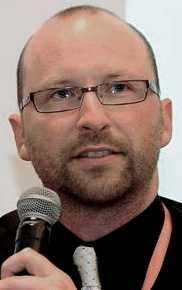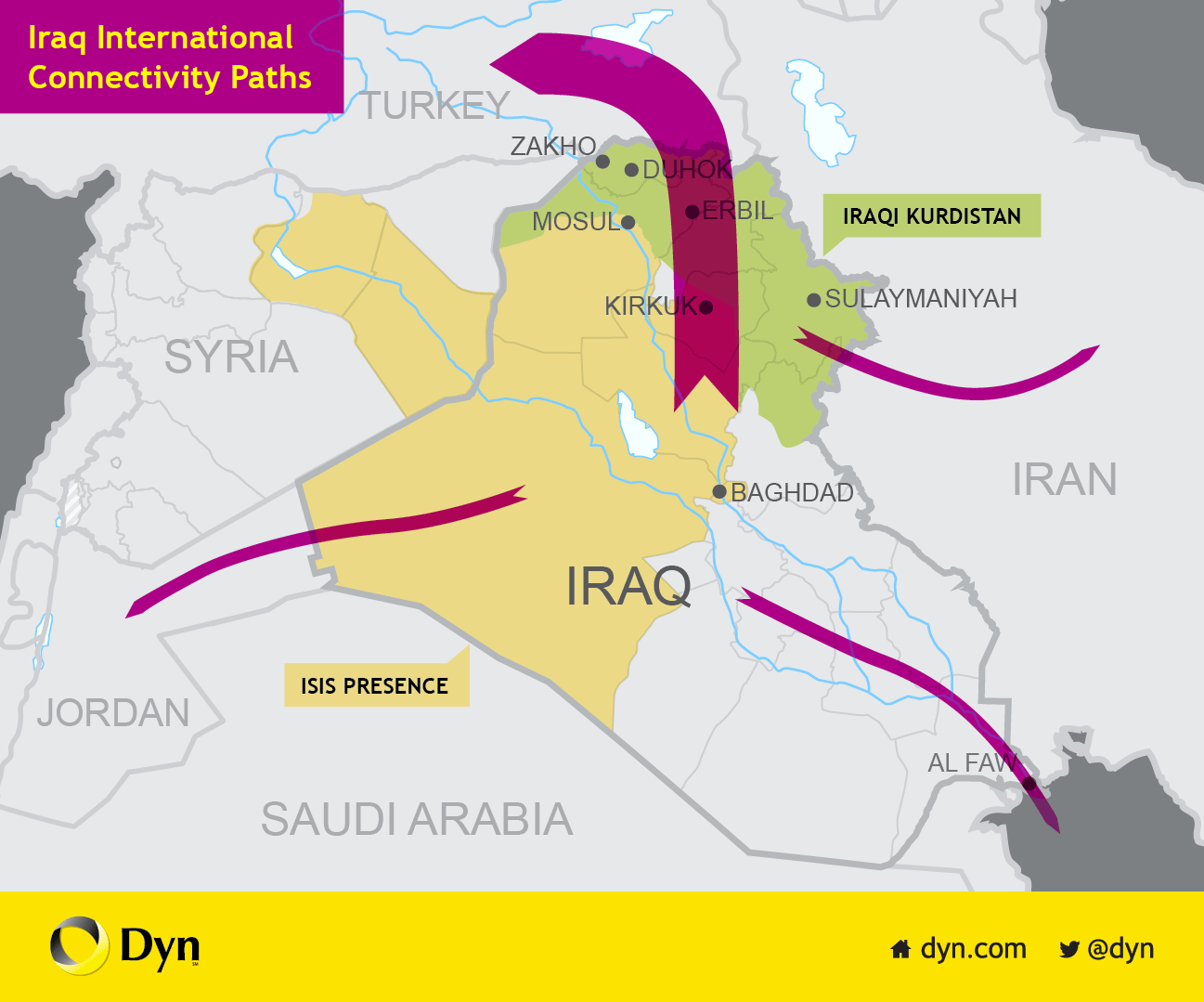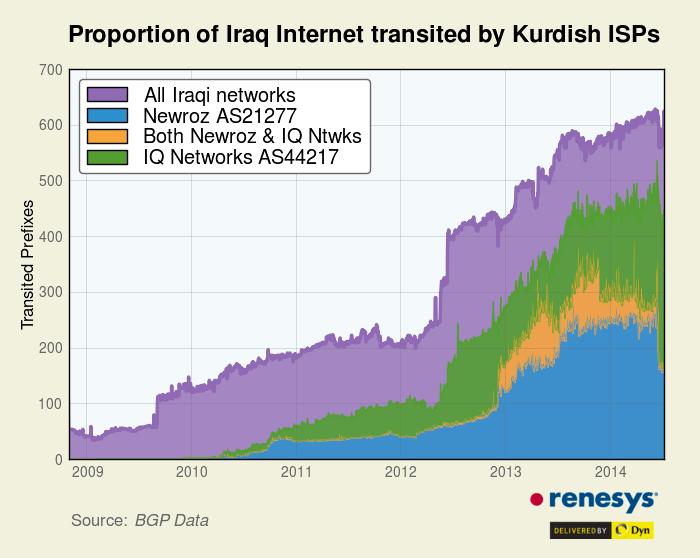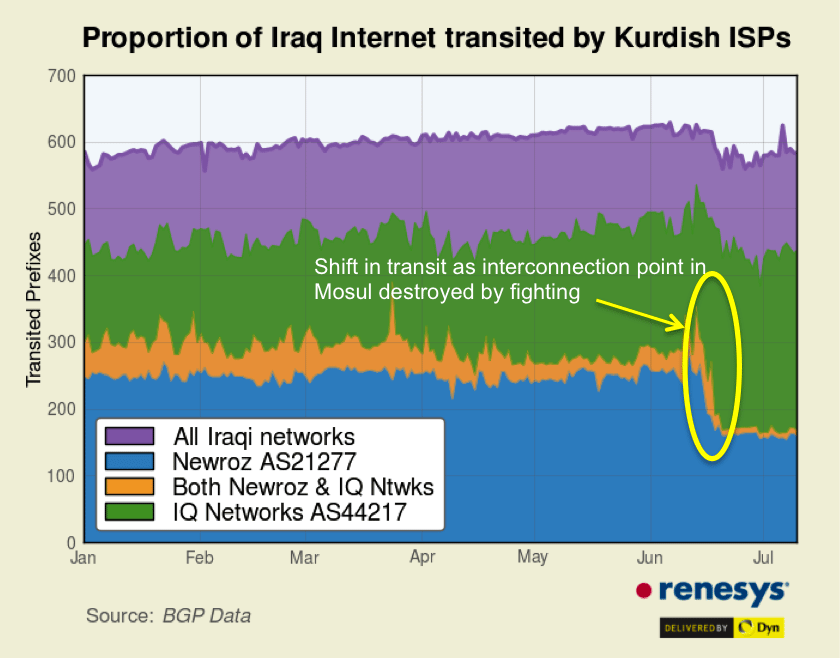

|
||
|
||
Editor’s Note: On the 25th of September, the northern autonomous region of Iraq known as Kurdistan voted to become an independent country. This vote has led to a current standoff between the central Iraqi government and the Kurdish Regional Government (KRG), with the Kurds threatening to cut off internet service into Iraq in retaliation for any punitive measures inflicted by Baghdad on the KRG. [1] The following analysis was written by Doug Madory of Oracle Dyn after ISIS took control of Mosul, Iraq in 2014. It describes how the internet of Iraq came to be dependent on international connections through telecoms based in Kurdistan.
The violence in Iraq and the government’s actions to block social media and other Internet services have put a spotlight on the Iraqi Internet. However, an overlooked but important dynamic in understanding the current Iraqi Internet is the central role Kurdish ISPs play in connecting the entire country to the global Internet.
In the past five years, the Internet of Iraq has gone from about 50 networks (routed prefixes) to over 600. And what is most noteworthy this that the growth has not occurred as a result of increased connectivity from the submarine cable landing at Al Faw, as would be expected in a typical environment. Instead, the dominant players in the Iraqi wholesale market are two Kurdish ISPs that connect to the global Internet through Turkey and Iran: Newroz and IQ Networks.
Help from the Kurds
 Iraq International Connectivity PathsThe Iraqi Kurdistan region contains four main cities: Erbil, Duhok, Zakho and Sulaymaniyah. Newroz covers the first three, while IQ Networks provides service in the last. However, it would be incorrect to simply classify these providers as city-level retail ISPs. They also carry significant amounts of traffic for the rest of the country.
Iraq International Connectivity PathsThe Iraqi Kurdistan region contains four main cities: Erbil, Duhok, Zakho and Sulaymaniyah. Newroz covers the first three, while IQ Networks provides service in the last. However, it would be incorrect to simply classify these providers as city-level retail ISPs. They also carry significant amounts of traffic for the rest of the country.
From the relative peace and stability of Kurdistan, Newroz and IQ Networks sell transit to Iraqi ISPs in the biggest markets—those in the middle and south of Iraq. Central Iraq ISPs, such as Earthlink, ScopeSky, and FastIraq, attain transit from the Kurdish providers by connecting in northern Iraqi cities of Mosul and Kirkuk.
Five years Iraqi Internet growth
 Overall growth of the Iraqi Internet over the last five and a half years.The graph right illustrates the overall growth of the Iraqi Internet over the last five and a half years. The total count of Iraqi networks (routed prefixes) is depicted in purple and the networks transited by either Newroz (blue), IQ Networks (green) or both (yellow) are overlaid as a stacked plot in the forefront. At last count, 73% of Iraq networks are routed through these two providers. And if you count unique IP addresses, these two Kurdish providers transit 86% of all Iraqi IP address space.
Overall growth of the Iraqi Internet over the last five and a half years.The graph right illustrates the overall growth of the Iraqi Internet over the last five and a half years. The total count of Iraqi networks (routed prefixes) is depicted in purple and the networks transited by either Newroz (blue), IQ Networks (green) or both (yellow) are overlaid as a stacked plot in the forefront. At last count, 73% of Iraq networks are routed through these two providers. And if you count unique IP addresses, these two Kurdish providers transit 86% of all Iraqi IP address space.
The remaining networks are either routed through Jordan (e.g. Earthlink to Damamax), various satellite service providers, smaller direct connections to Turkey or submarine cable connectivity at the Al Faw cable landing (most notably ITC service to GTT). Recorded remarks by Prime Minister Nouri al-Maliki at the opening ceremony of ITC fiber service can be watched here during which he said, “fiber optic cables have paved the way in revolutionizing the world of communications and this will now be witnessed in Iraq.”
 Proportion of Iraq Internet transited by Kurdish ISPsThe graph (right) is similar to the previous one but limited to just 2014 to more clearly illustrate recent changes. You can see a discontinuity in June as militants destroyed an interconnection point in Mosul, impacting Internet traffic transited by Newroz from central Iraq. Most notably Earthlink lost its service from Newroz and Damamax in this incident.
Proportion of Iraq Internet transited by Kurdish ISPsThe graph (right) is similar to the previous one but limited to just 2014 to more clearly illustrate recent changes. You can see a discontinuity in June as militants destroyed an interconnection point in Mosul, impacting Internet traffic transited by Newroz from central Iraq. Most notably Earthlink lost its service from Newroz and Damamax in this incident.
Low Risk of Disconnection
In 2012, Jim Cowie classified Iraq as “low risk of disconnection” in his blog post Could it happen in your country?. The conclusion was that due to the diversity of external transit sources (submarine cable, satellite, and terrestrial via Turkey, Iran and Jordan), it would be difficult to completely disconnect the Iraq from the global Internet. It may be cold comfort for those Iraqis who were (and still are) impacted by the recent blackouts, but this back-of-the-envelope analysis was proven correct by recent events.
[1] https://www.nytimes.com/2017/09/29/world/middleeast/iraq-kurds-referendum.html
(Vahal Ali, director of communications in the office of Massoud Barzani, the Kurdish region’s president) also warned of measures that the Kurdish regional government could take if Iraq’s crackdown on air travel and the borders continued, including severing internet and mobile telephone coverage, much of it based in the region, and even the supply of cement, most of which comes from the region.
Sponsored byWhoisXML API

Sponsored byVerisign

Sponsored byRadix

Sponsored byVerisign

Sponsored byIPv4.Global

Sponsored byCSC

Sponsored byDNIB.com
